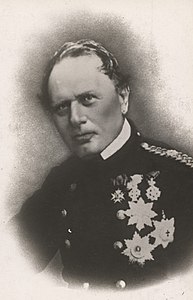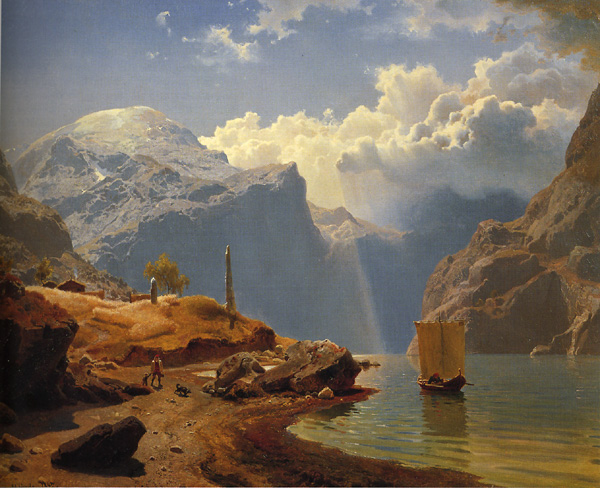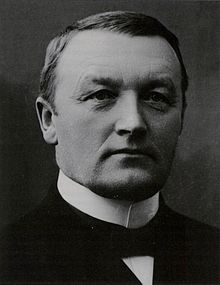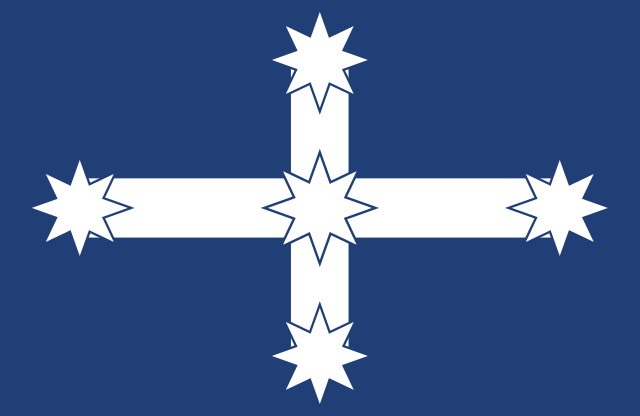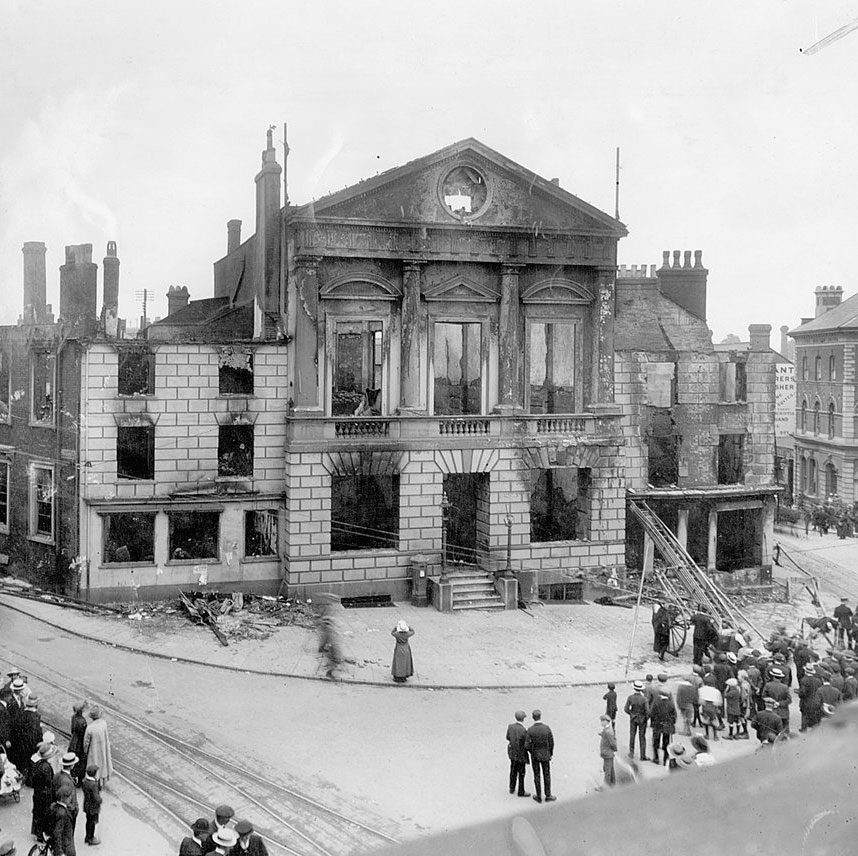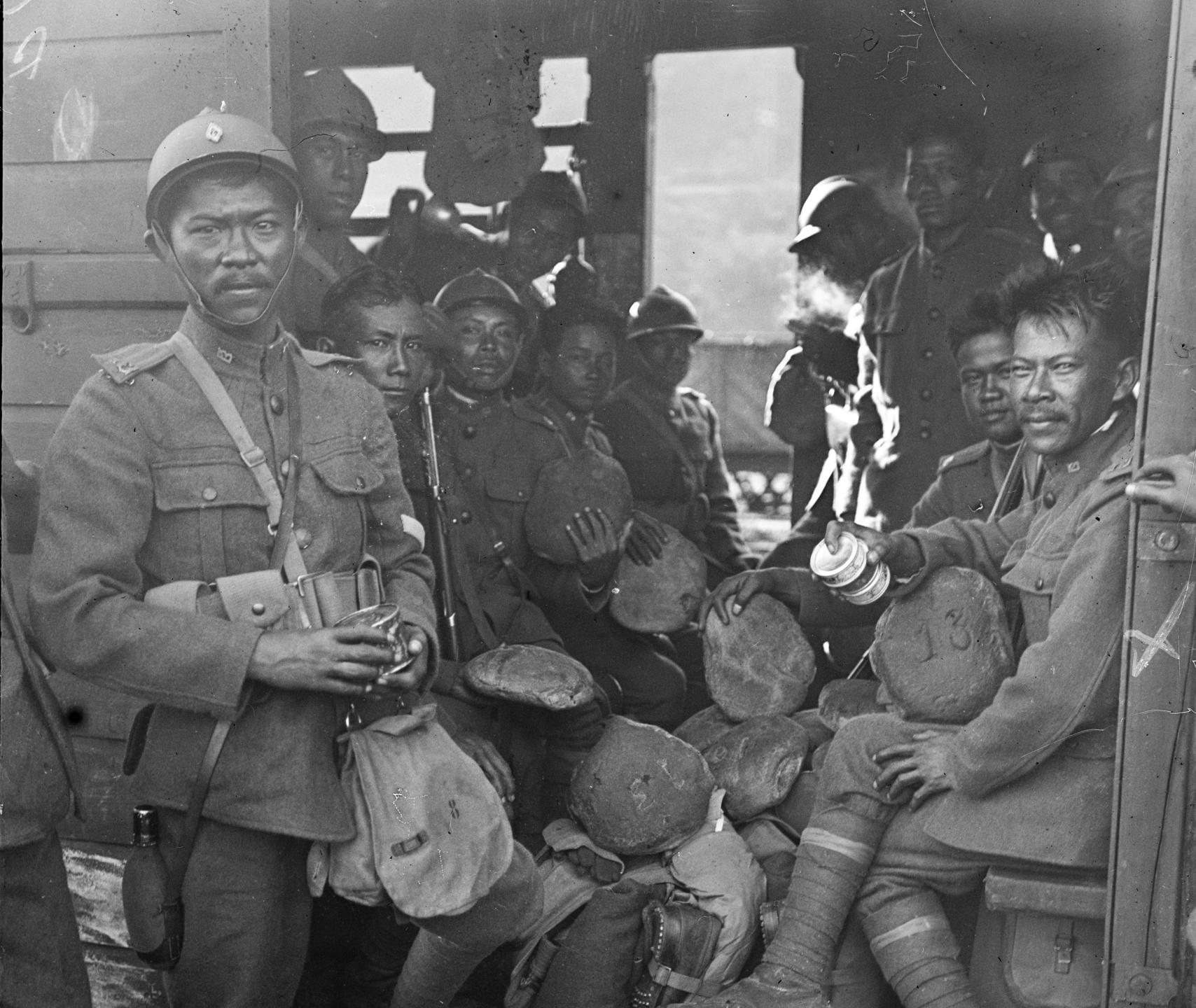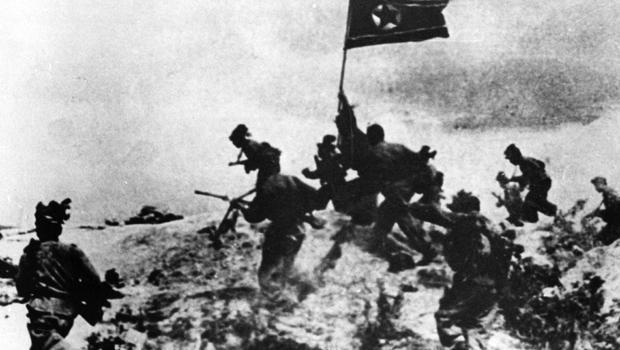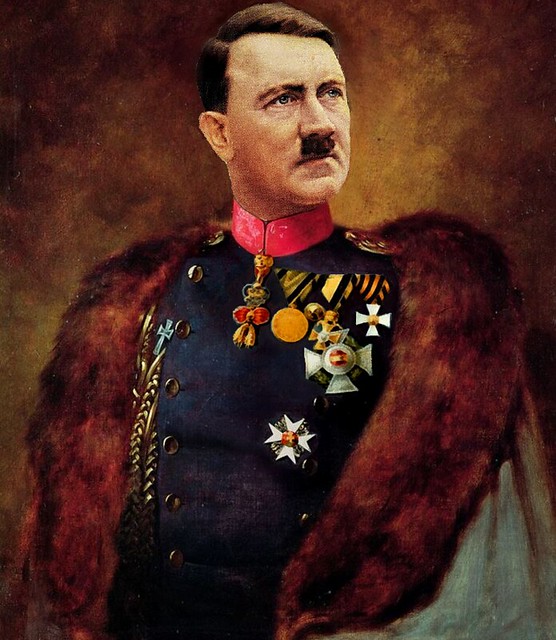A MOST IMPRESSIVE PARADE
The Home Guard Legion of Army Group I, Lincoln's Hammer, parades before the President during
the 1931 Remembrance Parade
Joe Steele stood on the wood and steel platform overlooking the Pittsburgh Rally Grounds with a smile upon his face. It was Patriot-Saints Day Eve, 1931. It had been barely a month since the Masonic Purges. Since then, every Masonic lodge in the Union had been shut down, its treasures and records plundered, and the structures set alight or gutted. ORRA was doing a fine job, all around, and the purge had gone seamlessly. Without a doubt, following both that purge and his complete purification of the Economic Clans, nobody doubted his rule. His word was absolute, an unquestioned Strong Man of Pinnacle Blood, one who endured through the changes the modern world was bringing and sculpted that world, in turn, in his own image. Every street and every house had a picture of Joe Steele. You could get a free portrait to hang up in your home at any government or military building. Some people hung up a portrait in every room, even, just to be on the safe side and to show their enduring love and admiration for the Great Atheling. Like an Old Testament ruler, he had come down from the political mountains during the end of the Great World War to seize power for himself in the name of preserving and bringing the Union into a new era of unquestioned supremacy. Before the war, America had been one of many great powers, but now it stood with Europa and perhaps Russia as one of the three main superpowers. Their control over the hemisphere was unquestioned. The Neutrality Pact in South America constantly squabbled with Eduist Brazil, leaving them divided against the menace ever-encroaching from the North.
As Steele pondered the global situation and took a puff of a Cuban cigar, Supreme Marshal Ambrose Jansen, the Hero of the Great War, approached and saluted. He had just marched up the podium to join the cluster of high commanders and politicians accompanying Steele to observe the annual Remembrance Parade. "All hail!" Jansen bellowed in his gallant Southron accent, clicking his heels together and extending his right arm. "My Atheling, my President, I assume you are well, sir?"
Steele smiled and gingerly returned the salute. "All hail, Supreme Marshal. Yes, I am well and happy this Patriot-Saints Day Eve. Did you get that gift I sent you last night?"
Jansen forced a smile and replied, "Oh, yes... of course! My family was ecstatic to receive a signed copy of your memoirs. I shall read them to my grandchildren at bedtime, so they may learn what it truly is to be a Pinnacle warrior of Christ, my Atheling."
Pretending like he was holding an invisible grinder gun at the group of officials present, Steele made as if he was raking gunfire over dozens of enemies. "All the shooting in the chapters about my time in the Nippon War! I love that stuff. All the killing! TCH-TCH-TCH-TCH!" the President said, making popping noises with his cheeks while smiling broadly and genuinely. The nearby officials looked positively horrified but tried to pass off their nervousness as all in good fun.
"Lotta killing, yessir," Jansen gave an awkward chuckle while checking his wristwatch nervously.
"Don't worry, men," Steele said at the sheepish, quite unsettled big wigs he had been pretending to mow down like wild animals seconds before. He waved his hand disinterestedly and told them, "If I wanted to kill you, hah, I'd feed you to Castor and Pollux! You gentlemen ready to watch the best gosh-darn parade this side of the Pearly Gates?" Castor and Pollux were, of course, the famous Presidential Mansion mascot alligators. Descendants of alligators from Lake Toho kept by President Custer, there were never any totally reliable stories about Steele feeding anything but pork and beef to them, but there were still stories nonetheless, and Steele loved to build up his terrifying reputation.
The men and women present all clicked their heels and saluted, shouting "Yes, my Atheling!" in unison.
"How's the wife, Jansen?" Steele asked, chipper as the day he was born.
"Susie is doing great. I trust Milli is fine?" Jansen replied.
Steele nodded briskly, smiling. "Yes, yes indeed. Ever an Arkham, though. Crazy broad. I do very much love her dearly. All-American family, just like yours, eh, Jansen?"
"My family could never hold a candle to yours, but we try, sir," Jansen said respectfully and tactfully, bowing his head slightly.
Steele gave him a pat on the back. "Attaboy, Jansen. You know how I love family values... and how I expect my leading officers to set an example." Another eerie, almost godlike smile emerged from under that world-famous black mustache.
Jansen's skin crawled as he knew Steele had his entire estate bugged for any evidence of breaking some moral standard by which Steele judged the world. Lucky for Jansen, his post-marriage dalliances were far in the past. He was a faithful husband to his wife, or so he hoped Steele thought.
The Pittsburgh Rally Grounds were truly massive on a scale unseen even in Paris. There was room for easily a million troops and there were endless rows of seats for civilians and officials to take in the exhibition. The entrance to the Rally Grounds was located on the eastern side of the colossal structure, while the exit was on the western side, symbolizing Manifest Destiny itself. The outside walls were adorned with statues of great men and women from American and world history, such as the Prophet Burr, the Martyr Arnold, Richard the Lionheart, Queen Elizabeth, Acton Arkham, and Martin Luther. All spiritual predecessors to the current American regime... or at least, so the American government claimed. There were, by now, about as many Lutherans in America as Mexicans. The American Fundamentalist Church held a complete spiritual monopoly over the country. One statue was noticeably different, however. It was an eight-foot representation of someone in a military uniform, but who it was could not be made out, because a sheet covered his head. Another feature of Steele's purges, the statue would likely soon be ripped down from the alcove in which it sat and smashed apart with sledge hammers. No one looked at, or even remarked upon, the hidden statue, as it was par for the course of Steele's obsession with murder and destroying those he deemed anti-American. Inside the walls of the Rally Grounds, right under the seating, were dozens of little shops. Some offered donuts and hamburgers, while others sold trinkets, knickknacks, ash trays, and replica military items of varying scales. Every branch of the military also had a recruiting station, using the glamor of the parades to lure in young men and women to the service. It was all highly thought-out and organized to a letter. The Rally Grounds had gone up not long before the Turn of the Century, but the post-Great World War era saw massive changes and improvements.
The platform on which Steele and his troupe of assorted jackboot-licking morons and ninnies stood was directly in front of the main seating area, just inside the entrance. All around the platform stood armed ORRA men, two with belt-fed grinders, ready to blast anyone who made a move against the President. Coming up the stairs of the platform was ORRA Supreme Chief Patton, in his his most flamboyant knee-length overcoat, medals pinned on him like lights on a Patriot-Saints Day Liberty Tree, probably to hide his legs strapped with braces and supports so he could make it up the steps of his own power. A faithful adjutant rolled his hated wheelchair not far behind, just in case, his expression blank as he watched Patton visibly struggle to even make it up the first few steps. As second-in-command of the Union, the last thing Patton wanted was to look weak.
Steele walked over to the top of the steps and said to the crippled Supreme Chief, "Patriot-Comrade Patton, why don't you just let them carry you up the steps in your chair. We have seen you climb stairs before. It's a damn holiday, man, just enjoy yourself."
Huffing and wheezing in the 30 degree temperature, the struggling Patton looked up and said, "With all due respect, my Atheling, I need the exercise. I will be up shortly."
Steele looked up at the sky, rolled his eyes, and outstretched his arms, as if he couldn't understand his right-hand man's stubbornness. Without a moment's hesitation after that, he walked over to the steps and met Patton halfway, grabbing his arm like a viking of old and practically heaving him up the steps. The crowds went wild at the show of friendship. Patton was rather shocked and embarrassed but quickly turned to face the crowd and salute and wave, his eyes beaming under his dark blue pot helmet. "My Atheling..." he awkwardly said as he turned again to face Steele once more, "...thank you. I will never forget that. All hail!" Patton sprung his right arm out in salute. Steele responded to the salute and then motioned for Patton to join him over on the front of the platform. If he leaned against the railing and relied on his braces, Patton could easily stand for the two hours or so that the parade went on for. He had trained himself to do so, no matter how painful it was.
Artie Mays, the voice of Uncle Sam's Talkiebox Station Evening News Report, was present and in full form to announce the different parts of the parade and address the crowd. His voiced boomed off the state of the art sound system wired in throughout the structure. It was a wonder the audio equipment along didn't cause a brown-out for the greater Pittsburgh metro area. "Gooddddddd evening, America! All hail! The Joint Supreme Chiefs of the Republican Union Armed Forces, Supreme Marshal Ambrose Jansen, and President Joseph Steele, Atheling of the Manifest Destiny Party and Defender of our Faith, welcome you all to another glorious night of family fun, music, marching, and revelry for the Betters of Society at the 39th Annual Pittsburgh Rally Grounds Remembrance Parade. Over 800,000 Pinnacle-blooded men and women will be present, representing every branch and service of our totally undefeated and valorous military. And remember to smile, because you're on camera! That's right, comrade-patriots! Director Benny Riechenthal of Lucky Duck Studios is here to shoot his masterpiece, Triumph Unending, and you will all play a part. Let your patriotic fervor take you to new heights tonight as we celebrate and mourn all those who have died in service to the homeland. All hail the Martyrs of the Union! All hail the Glorious Dead! All hail President Steel!"
"ALL HAIL THE GLORIOUS DEAD! ALL HAIL PRESIDENT STEELE!" screamed the crowd, almost foaming at the mouth. Genuine joy was on their faces. Steele's popularity had never been higher. While Europe's economy had been going downhill lately, America's was stronger than ever. If anyone present was not feeling patriotic that day, they didn't dare let the mask slip. Later that night, many of the youngest would be drunk and going into the Infee ghettos dressed in their Nightstalker costumes, feverishly beating their victims with clubs and rocks and knives. It was the most wonderful time of the year once again.
Shortly after the first announcement, Artie Mays again took to the loudspeakers to say, "Patriot-Comrades, please rise for the Living Word of the Voice of the Prophet, May He Rest In Peace." At that, a complete dead silence fell over everyone present, from the observation platform to the rows and rows of civilian onlookers. From the same door Patton had arrived from came two elderly men in full ORRA dress uniforms, their uniforms completely bedecked with medals going back decades. They were the Voice of the Prophet Honor Guard. Behind them, an AFC Zealot carrying the flag of the Church clicked his way forward. Next, behind even him, came Reverend Colonel Billy Sunday and his right hand, the Church Chief of Studies on the Other Side, Howard Lovecraft. The two elderly ORRA officers, likely veterans of some nearly forgotten war of conquest of a bygone decade, shuffled forward. In their hands, sharing the load between the two of them, was a box with red and white striped velvet pillows within. Resting on the cushion was a small strongbox, of ancient appearance and sporting a curious hole on one side. Reverend Colonel Sunday carried a small L-shaped rod in his left hand, and the AFC Standard Bible in the right.
The procession finally made it to where Steele, Patton, Jansen, and the others were at, setting the package where Steele would normally speak, adjusting the microphone so it could pick up whatever noise was to emanate from the strange relic. With dramatic flair, Sunday inserted the rod into the side of the box, revealing it to be a crank. Slowly, he began to turn it, powering up the device. A small slat was moved away from the front of the relic, revealing a soundhole. The sound of a fresh needle meeting ancient wax crackled over the speakers of the Rally Grounds, finally breaking the silence. Sunday and Lovecraft stared at the device, their foreheads sweaty even in the cold, always terrified that the holy relic would break at the slightest wrong movement.
"Manifest Destiny sha--*crackle*--heal our wounds and sorrows, *crackle* God our Lord has set us above all other nations!"
As the recording ended, the dead silence returned. The voice of the Prophet, Aaron Burr, the fiery founder of the American Fundamentalist Christian Church and the Father of Manifest Destiny itself, the man to whom the Angel of Destiny had revealed Himself, had just spoke to America once more. Even to those who had heard the recording every Remembrance Parade, it still struck them with a feeling of near-divinity, almost as if Christ had spoken to them himself. Every single person there had their right arms high and proud as Sunday and Lovecraft gently withdrew the rod and closed the soundhole. A small American flag, one of ancient manufacture, was gently folded over the box. The two elderly ORRA men then went back from whence they came, descending the steps carefully and carrying the Voice of the Prophet back through their doorway. Way before any other part of the ceremony started, it was already loaded into an armored van and driven out under escort heavy enough to make a Europan Caesar blush.
"AMENNNN!"
Like a wave of rolling thunder, the cry erupted from the stands, going from one person to the next like a chain letter. The entire Rally Grounds shook. Joe Steele clasped his hands behind his back and faced the crowd, smiling again.
As the crowd finally calmed down, Mays again spoke. "Patriot-Comrades, please remain standing for a word from our President, our Atheling, Patriot-Comrade Joseph Steele. All hail!"
"ALL HAIL!" the crowd bellowed in response before going dead silent once more.
Steele adjusted the microphone to once more reach his mouth. Sunday was supposed to have returned the microphone to its proper position after the Voice of the Prophet was over. He shot Sunday an evil look as he fixed it, feedback echoing throughout the Rally Grounds. Sunday bit his lower lip and tried to hide his horror. Patton smiled wickedly, knowing what was going on instantly. Finally, Steele spoke. "As your President! As your Atheling of the Manifest Destiny Party! As the Defender of the American Fundamentalist Christian Faith! I hereby announce the 39th Annual Pittsburgh Rally Grounds Remembrance Parade to be underway! All hail the Glorious Dead!"
"ALL HAIL THE GLORIOUS DEAD!" chanted the people.
Mays returned to the loudspeaker again. "Ladies and gentlemen, comrades and patriots, let's give a big hand to the 29th Flying Knights Squadron of the Republican Union Aeroforce! Representing the Aeroforce today on the observation platform is the noble Aeroforce Supreme Chief Charles Sutton! All hail!"
"ALL HAIL!"
A deep humming sound came from the horizon. Dark shapes on the gray winter sky turned into prop-jobs, flying low. Behind them streamed red, white, and blue smoke. The crowd went wild as 24 fighter planes, state of the art, buzzed the Rally Grounds, going directly from east to west, symbolically. The 29th Flying Knights were the most advanced unit in the Aeroforce, but hardly the only. While they opened the parade, they were followed by hundreds upon hundreds of droning biplanes, aeroships, bombers, and flyers of every shape and size. The sky was darkened by American might. Steele and the leadership on the platform applauded, clapping their gloved hands in unison.
"Gentlemen and ladies, patriots and comrades, we are pleased to announce the first ground units of today's event. Coming from our nearby sister city of Philadelphia, our beloved nation's capital, hails the 30,000 brave souls of the Home Guard Legion, of Army Group I. The Pride of Lincoln's Hammer represents the best of the American Army, also represented on the platform today by the heroic Supreme Marshal Ambrose Jansen! The Home Guard Legion, and the rest of Lincoln's Hammer, fought in the bloodiest battles of the Great American War, Mexico, Holy Nippon, and the Great World War. They are led by the President's Own Musician Corps, and the song they are performing is a hit from the tenure of Strong Abe, our beloved dictator, We Are Coming Father Abraham! All hail!"
"If you look across the hilltops that meet the Northern sky,
Long moving lines of rising dust your vision may descry;
And now the wind, an instant, tears the cloudy veil aside,
And floats aloft our spangled flag in glory and in pride;
And Eagle Banners in the sunlight gleam, and bands brave music pour,
We are coming, Father Abraham, 300,000 more!"
The people applauded as if their lives depended on it as the red-coat musicians, adorned with tri-cornered hats, led the Home Guard, who were sporting new-style olive drab uniforms, jackboots, and pot helmets. Each man sported a small red and white ribbon over his chest featuring a central button with the profiles of the Prophet, Lincoln, Custer, and Steele in a modern, embossed style. This matched banners draped all over the grounds and even on commemorative sweaters being sold in the gift shops. It was a new design for that year, and it was a big hit with Steele personally. On each side of the Home Guard procession gallant officers rode on massive warhorses, bred in the Kaintuck region of Appalachia. The officers, sporting the old-fashioned blue cavalry hats with double-breasted blue tunics, held out lances and sword to salute the leadership of the country on the platform. The rank-and-file young soldiers snapped their heads to the right as they marched past in a show of respect. Some had tears streaming down their cheeks at actually being able to see Steele so close.
As the fife and drums pounded out their tune, Steele nudged Jansen and said with a laugh, "These boys haven't seen a real war. They are too young to remember my last pair of socks!"
Jansen once again smiled politely and said, "Well, your excellency, if you wish to see them in combat, you may need only to point them at an enemy and tell them 'kill,' and you shall see their true mettle. They would all die for you, sir."
Steele shrugged and asked, "What about you?"
"Sir?" Jansen looked uncomfortable once more.
"Would you die for me?" Steele asked, waving at the troops the whole time.
Jansen cocked his head and said, "Of... of course, my Atheling. It is my duty as a soldier, a loyal Party man, and a patriot to lay down my life for my glorious leader if need be. I ask only for a place in Valhalla at the right hand of the God of War!" He seemed to grow more confident as he spoke.
"Perhaps at the right hand of your father as well, eh, Ambrose?" Steele winked, an evil, mischievous look on his face. He was referring to Robert Ambrose Jansen, one of the Virginian commanders of the Great American War nearly 80 years before.
Jansen looked disgusted. "Sir, my father is burning in Hellfire, where all enemies of the state shall spend eternity," he said with a sincere voice and an expression of absolute assurance.
"It's a good thing I'm among the Saven, Jansen," Steele said.
"Sir?"
"Because if I weren't, and I was to be, how you say, hellbound, I would like to think I would take over Hell in short order. Satan's had a good run. Might be time for a Strong Man." Steele said these things with a straight face before busting out in a menacing laugh and then stroking his bushy black mustache. "By the way, Jansen, on the topic of Hell, I wish to eventually take over South America completely and purify our hemisphere. Please draw up plans for a conquest. The seed of that idea came to me earlier while I was in my sauna enjoying some puncture therapy. The seed wormed around awhile before fertilizing my mind's egg and developing into a fetus of Manifest Destiny. Jehovah works in mysterious ways, eh?"
Cold sweat dripped down Jansen's face and onto his snowy eyebrows as he realized once more how absolutely violently psychotic his President was. He laughed once, quite awkwardly, before turning once more to face the troops and wave. "Yes, sir. I'll get the boys in the war room on it ASAP, sir."
Last edited:


